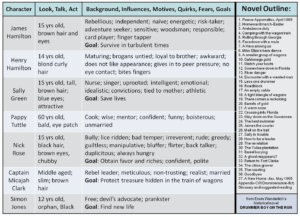 I hope this unfortunate stay-at-home time finds you healthy and itching to write. Indeed, did you know that this year marks the 200th anniversary of James Fenimore Cooper’s first novel The Spy? Many recognize Cooper as our country’s first great novelist. Since I was a teenager, his wordy novels have always drawn me in with their heroic accounts of difficult times in early America. Consequently, those of us who might want to honor Cooper this year with our own Great American Novel had better get started now.
I hope this unfortunate stay-at-home time finds you healthy and itching to write. Indeed, did you know that this year marks the 200th anniversary of James Fenimore Cooper’s first novel The Spy? Many recognize Cooper as our country’s first great novelist. Since I was a teenager, his wordy novels have always drawn me in with their heroic accounts of difficult times in early America. Consequently, those of us who might want to honor Cooper this year with our own Great American Novel had better get started now.
Topic
Perhaps you have a rough idea of your story’s topic, and know it can be a fascinating read someday. My novels concern credible or real events in the Civil War. Sometimes I blend a few of my own family stories into the mix. The one I’m working on now will have a female protagonist in such a setting. Okay, so let’s say you have a great idea in mind for a story, and are wondering where to go next.
Ingredients

People say not to look at how the sausage is made, or it’ll scare you away. In the case of writing a novel, however, I have trouble producing a credible draft without two ready-reference items:
- a character chart that shows who’s who and guides me on mannerisms to re-emphasize scene-to-scene
- an outline to keep my plot from stagnating night-to-night in, say, the hero’s journey over his or her, and my, roughly 300 pages.
I put in the above graphic to show these two necessities in a single table. Your specifics will vary, so the details within the graphic are unimportant, per se.
Characters
The character descriptions should include how that individual will look, talk, and act, as well as what will be their background, influences, motives, quirks, fears, and goals. To generate this table, recall “characters’”from your past, or, say, watch for interesting characters portrayed in old black & white television movies. I love to include sidekicks by the way, as were often in such movies. By the end of the novel, the characters will have achieved my goals for them. A note of caution: change your characters’ names and flaws so you don’t inadvertently offend a real person.
Outline
My earlier background was as an engineer, so perhaps I am more in need of a “plot roadmap” than other writers. The outline then gives me an agenda for each week’s 1,000 or so words — specifically, say, that the scenes need to address a certain predicament the hero will encounter. I don’t like a lot of words in an outline though, just so there is enough to cue me on what to write about. The outline piece is also a very fluid document, subject to frequent changes as the writing progresses.
To produce an outline, you need to read, read more, and then read even more. It seems easier for me to read now with the present stay-at-home situation, and I look for old subject matter books on the internet that nobody wants anymore. This reading of huge amounts of historical accounts allows my creating an outline that is a credible sequence of hopefully exciting scenes.
The outline may sometimes be your table of contents in a fiction work. Further, the outline might allow a novelist to write a projected synopsis in a query letter to an agent, say, when you’ve drafted and edited only the first 50 pages.
In conclusion, having a character chart and outline should allow you to proceed full speed ahead with your novel. Consider James Fenimore Cooper’s words in his Last of the Mohicans, “Every trail has its end, and every calamity brings its lessons!” In the months and years ahead, I wish you success in answering the call of your own trail.

Gerri Almand
I enjoyed reading this informative, inspiring pot. It “almost” gives me the courage to try my hand at fiction. Thanks for such a concise primer for anyone considering a new genre.
Erwin
How nice. Go for it, and get your local writer’s club to comment on say your ~3 fiction pages per week. But stay safe with this pandemic!
Lynda Courtright
Thanks – this is practical and encouraging.
Erwin Wunderlich
Thank you—good luck!